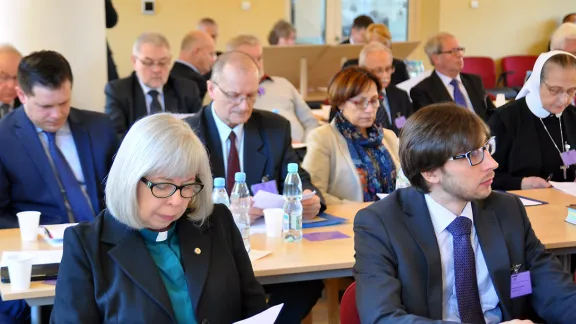
At the 1-3 April synod of the Polish Lutheran church, many theologians and congregation members took part in discussion on womenâs ordination to pastoral ministry and supported the move. Photo: Beata Michalek
Advocating for a church with women in ordained ministry
(LWI) - At the recent synod of the Polish Lutheran church, a majority voted in favor of the ordination of women to the pastoral ministry. However, it failed to reach the two-thirds majority required for change in the by-laws of the church. Presiding Bishop Jerzy Samiec says this does not indicate the church has relented on its position of appointing women to the ordained ministry of the church.
“Women have been ordained as deacons, and this situation has not changed after the Synod’s decision,” said Samiec, head of the Evangelical Church of the Augsburg Confession in Poland. A secret ballot for a motion to ordain women presented at the 1-3 April synod of the church registered a simple majority of 38 votes for, 26 against and 4 abstentions. It fell short of the two-thirds majority stipulated in the church’s constitution to change the by-laws on ordaining women as pastors
Speaking to Lutheran World Information after the meeting in Warsaw, the bishop noted that opponents and supporters of “full” ordination of women had reached common positions on many divergent points, especially since the 2014 Synod. He was hopeful the resolution would gradually be passed. “The church is on the way and everything has its place and time. Probably this time has not come yet. I feel sad but I am also full of hope that it will come one day. Maybe sooner than we think?”
A press statement following the vote stated that discussion on women’s ordination in the church had been going on for over 70 years. Since 1963 women graduates of theology have been able to teach, conduct church services and provide pastoral care in congregations. A 1999 decision to ordain women as deacons meant women could also provide diaconal services, and conduct baptisms, marriages and funerals. However, they cannot be ordained as pastors, which in the Evangelical Church of the Augsburg Confession in Poland means they are not allowed to lead congregations or preside when celebrating Holy Communion.
Diligent arguments
Samiec said the fact that all synod members took part in the recent voting, which for the first time showed majority support for women’s ordination to the pastoral ministry, meant that “most of the synod members see the need for such ordination.” He thanked opponents of the motion for diligent arguments which had helped to clarify what should be discussed further. The synod is made up of 40 lay and 28 ordained members, who include 14 women.
Women have been ordained as deacons, and this situation has not changed after the synod’s decision.
He emphasized that the Polish Lutheran church “recognizes one office with the three ministries of deacon, pastor and bishop, to which the church appoints individuals.” While there is strong agreement on equality between men and women, and on women’s contribution to the church, opponents still advance the argument that only men should lead a congregation. This traditional attribution of gender roles “is strongly influenced by the fact that we live in a predominantly Catholic country,” Samiec added.
Not alone
Agnieszka Godfrejów Tarnogórska, regional coordinator of The Lutheran World Federation (LWF) Women in Church and Society network in Central Eastern Europe said the synod vote was important despite its outcome. “For the first time Polish female theologians saw that they are not alone in this process, because the synod majority voted for women’s ordination.”
Many theologians including the bishops and congregation members were actively engaged in the discussion and supported the issue, she noted. However, not all opponents openly expressed their doubts “but their feelings and strong concern also for the church must be recognized.”
According to the press statement, the governing body will not revisit the issue when it meets for its second session this October.
Sometimes wounded but still bound in Jesus Christ
Evening devotion on the voting day included the hymn "Bind us together Lord." Worship leader Deacon Ewa Below, pointed out that “the voting result can’t change the fact that God has acknowledged my ministry.”
Reflecting on the important role of women in the Bible and the image of synod members standing side by side in a circle, singing together despite their different points of view, she said, “this made me understand that as a church we are on the way and the issue of women’s ordination is not a question of winning or losing. Everything has its meaning and time. The church is a community full of hopes, sometimes also wounded but still bound by God in Jesus Christ.”
The Evangelical Church of the Augsburg Confession in Poland has 70,000 members and it joined the LWF in 1947. Its six dioceses, each headed by a bishop, are organized into 133 parishes served by 154 pastors, and 11 women deacons.


